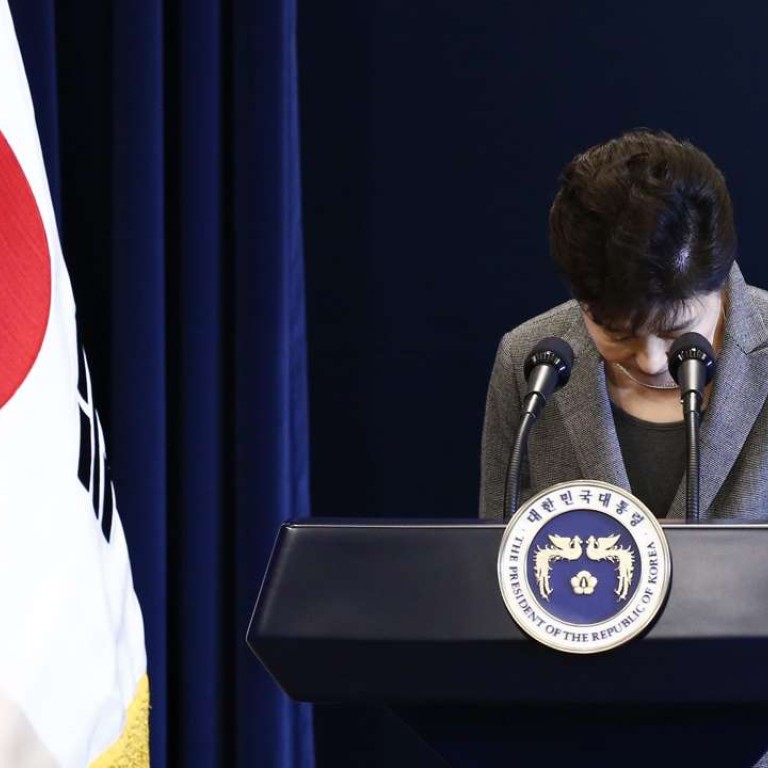
Analysis | Park Geun-hye’s impeachment raises new level of uncertainty on Korean peninsula
For China, the main issue is deployment of US THAAD defensive missiles
The South Korean parliament’s decision to impeach President Park Geun-hye has increased uncertainty on the Korean peninsula, adding to unease over North Korean leader Kim Jong-un’s ambitious nuclear programme and the unknown policy direction of US president-elect Donald Trump.
Although it was hard to say how Park’s fate would be decided, China could pin its hopes on a new president taking a different approach over the Terminal High Altitude Area Defence anti-missile system, given opinion in South Korea was deeply divided over the decision to deploy THAAD, observers said.
“China has restrained from making any move against South Korea, such as economic retaliation, but is waiting for it to change its mind on THAAD’s deployment,” Jilin University professor Wang Sheng said. “But no matter who is the next president, THAAD must be one the first things to deal with in relations because the Chinese government won’t wait too long.”
On Saturday, the day after the overwhelming vote to impeach Park, hundreds of thousands of people took to the streets of Seoul for a scheduled protest-turned-celebration.
Ban Ki-moon, who is in the final few weeks of his 10-year term as United Nations secretary general, is a popular candidate for president, although his links to Park have hurt his poll numbers.
Meanwhile, 63-year-old Moon Jae-in of the main opposition Minjoo Party, who supports the alliance with Washington as well as more “balanced diplomacy” with the US and China, is another likely candidate. Many in Moon’s party reportedly opposed Park’s decision to deploy THAAD.
Some Chinese analysts said Park’s impeachment was unlikely to produce any immediate thaw in bilateral ties, which have been frosty since July when Seoul agreed with Washington to deploy THAAD to defend itself from attacks from the North.
Beijing said its strategic interests in the region would be undermined by allowing the US-backed anti-missile system at its doorstep, and vowed to take strong countermeasures.
“I don’t expect any improvement in Sino-South Korea relations during Park’s suspension,” said Sun Xingjie, a Korean affairs expert at Jilin University. “This is because Park’s decision to deploy THAAD has in fact locked South Korea in the great game of power rivalry between China and the US, and [the damage] is irreversible.”
Zhang Tuosheng, director of the Centre for Foreign Policy Studies at the China Foundation for International and Strategic Studies, said Trump’s recent protocol-breaking phone conversation with Taiwanese President Tsai Ing-wen had already raised disquiet in the region and triggered fears of how he would deal with North Korea.
“Another unpredictable element is North Korea. It is uncertain whether it will would launch another nuclear test after the new year,” Zhang said.
Sun said the next South Korean president would face an aggressive Trump administration because “it is not hard to foresee a rising rivalry between China and US in the future”.
Beijing said on Friday that it was “closely watching” but had no intention to get involved in “the internal affairs” of South Korea. It also repeated its opposition to the deployment of THAAD.
“The deployment decision agreed upon during Park’s presidency affects China’s strategic and security interests,” foreign ministry spokesman Lu Kang said. “We firmly oppose the decision.”
Compared to Lee Myung-bak, her pro-US predecessor, Park, the first woman president of South Korea, has been deeply engaged with China.
A Putonghua speaker with an interest in Chinese philosophy, Park was described by President Xi Jinping as “an old friend” when she visited Beijing three months after becoming president in 2013.
As the only attending head of state of a US ally, Park sat next to Xi on the podium at Tiananmen Square to review a military parade to mark the 70th anniversary of Japan’s defeat in the second world war on September 3 last year.
Under South Korean law, the motion accusing Park of “extensive and serious violations of the Constitution and the law” has been referred to the Constitutional Court, which has up to 180 days to review the decision, during which time Park will be suspended from official duties. If Park is dismissed, new elections must take place before December 2017.


